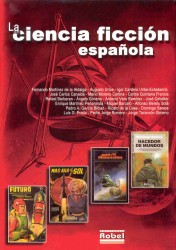
A special issue of “Science Fiction Studies” on Spanish SF has been announced.
SFS # 132 : Volume 44, Part 2 = July 2017
SPECIAL ISSUE ON SPANISH SF
Edited by Sara Martín and Fernando Ángel Moreno
• Sara Martín - “Introduction. Spanish SF: A Phantom Genre” (Full text)
• Fernando Ángel Moreno and Cristina Pérez - “An Overview of Spanish Science Fiction”
• Symposium on Spanish SF
• Mikel Peregrina and Jimena Escudero Pérez - “Domingo Santos: Bringing on the Golden Decade”
• Francisco J. López Arias - “The Spanish Civil War in Spanish Alternate History: Jesús Torbado’s En el día de hoy”
• Isabel Clúa - “Dark Mothers and Lovelorn Heroines: Avatars of the Feminine in Elia Barceló’s Sagrada”
• Dale J. Pratt - “The Jewels of Indra’s Net: Sublime Cosmologies and Juan Miguel Aguilera”
• Mariano Martín Rodríguez - “Alternate History in Spain: Eduardo Vaquerizo’s Tinieblas Series in Its Literary Context”
• Teresa López-Pellisa - “Alucinadas: Women Writers of Spanish Science Fiction”
• Irene Sanz - “Human and Nonhuman Intersections in Rosa Montero’s Bruna Husky Novels”
• Sara Martín and Fernando Ángel Moreno - “A Bibliography and Filmography of Spanish SF”
REVIEW-ESSAYS
• Terry Harpold - Roman Scientifique and its Discontents: Stableford’s The Plurality of Imaginary Worlds: The Evolution of French Roman Scientifique
• Jeff Hicks - The Return of the End of the World: Voigts/Voller’s Dystopia, Science Fiction, Post-Apocalypse, Cojocaru’s Violence and Dystopia, Mazurek’s A Sense of Apocalypse, and Hicks’s The Post-Apocalyptic Novel in the Twenty-First Century
BOOKS IN REVIEW
• Díez/Moreno’s Historia y antología de la ciencia ficción española (Mike Gomez)
• López-Pellisa’s Patologías de la realidad virtual (Dale Knickerbocker)
• Moreno’s Antología del cuento de ciencia ficción española actual (Rubén Sánchez Trigos and José Esteban Viera Betancor)
• Moreno’s Teoría de la literatura de ciencia ficción (Daniel Ferreras Savoye)
• Beck’s The War of the Worlds (Nicholas Ruddick)
• Chan’s The Racial Horizon of Utopia (Taylor Evans)
• Haraway’s Staying with the Trouble (Miranda Butler)
• Kears/Paz’s Medieval Science Fiction (Kristin Noone)
• Leleń’s H.G. Wells (Patrick A. McCarthy)
• Rieder/Dillon/Levy’s Indigenous Futurism (Victoria Miceli)
• Ruddick’s Science Fiction Adapted to Film (Barry Keith Grant)
• Sheldon’s The Child to Come (Brent Ryan Bellamy)
• Wythoff’s The Perversity of Things (Lisa Yaszek)
• Yaszek/Sharp’s Sisters of Tomorrow (Helen Merrick)
NOTES AND CORRESPONDENCE
• Wells’s “The Country of the Blind” and Medical Models of Disability (Brenda Tyrrell)
• On Extro-SF and Kalpabigyan (David Ketterer)
• On Heinlein and Detective Fiction (Patrick A. McCarthy)
• SF and the MLA (Lisa Swanstrom)
• Iraqi SF and the London Literature Festival (Sinéad Murphy)
• Report on a Conference in Beijing, China (Veronica Hollinger)
• Calls for Papers
http://www.depauw.edu/sfs/
“Spanish SF: A Phantom Genre” - Sara Martin
“Arielle Saiber and Umberto Rossi’s introduction to the Science Fiction Studies special issue on Italian science fiction (July 2015) raised many issues that closely correspond to the Spanish case.
Like Italy (60,6 million inhabitants), Spain (46,6 million inhabitants) has a very limited presence on the world map of sf production; and like Italy, Spain has failed to impress the international sf readership with a universally embraced classic.
The Italian editors praised, for example, the Czech Republic for contributing Karel Čapek’s new trope of the robot in his play R.U.R (1921), and I could praise Poland for contributing Stanisław Lem’s oeuvre.
Its low international impact does not mean, however, that Spanish SF is negligible: Fernando Ángel Moreno and Cristina Perez’s survey of the field and our joint bibliography/ filmography demonstrate the existence of an already long tradition of Spanish SF.
Yet, regrettably, most writers and titles seem to be invisible not only to foreign readers and spectators, but also to their local peers. It is for this reason that I call Spanish science fiction a “phantom genre.”
Like their Italian peers, however, Spanish SF writers and filmmakers face many difficulties in convincing their reluctant audience of the credibility of their texts, as local readers and spectators seemingly believe that sf stories can only happen in the US or the UK.
By “phantom genre” I mean a literary genre with a willfully ignored national tradition whose proliferation depends, paradoxically, on its being massively consumed in translation from English.
The impact of SF in Spain is doubly ignored by the cultural establishment, including academia: the translations are treated as an unwanted foreign intrusion, justified only for commercial reasons, and the subsequent generation of a local tradition is perceived as demeaning local parasitism.
It seems clear, despite this bigotry, that Spaniards do love SF, particularly if we measure this preference by the success of Anglophone films and TV series within the genre.
Spaniards seem less keen on reading SF, but there is certainly a lively market for translations (mostly from English) and a passionate and very erudite local fandom.”
http://www.depauw.edu/sfs/abstracts/a132.html#martin

